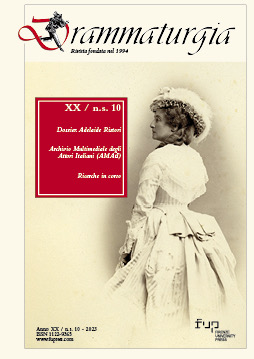«Tragedy and Ristori will die the same day». Contributions on the death of Romantic tragedy and the birth of art theatre in Portugal
Published 2023-12-22
Keywords
- Theatre Criticism,
- Tragedy,
- Portuguese Theatre,
- António Feliciano de Castilho,
- Adelaide Ristori
How to Cite
Copyright (c) 2023 Rui Pina Coelho

This work is licensed under a Creative Commons Attribution 4.0 International License.
Abstract
«Tragedy and Ristori will die the same day». This is how António Feliciano de Castilho, the infamous ultra-Romantic Portuguese writer and polemist, refers to the great Adelaide Ristori, in an inflated article published in the «Revista Contemporanea de Portugal e Brazil» in 1859. Ristori was in Lisbon – for her premiere in Portugal – to present Montabelli’s adaptation of Medea at the National Theatre of São Carlos. Castilho, in eight full pages, depicts an elegant, hyperbolic short biography of the Italian actress, portrayed emphatically as the great muse Melpômene. This Romantic way to address the art of acting – exaggerated, elusive, emotional, immensely subjective – was standard in 19th century theatre criticism. Ristori was received in Portugal with the same ardour. This essay examines the way Ristori was receive by some Portuguese press, in 1859; and evaluates the critical discourse that encapsulates the way the ‘Grande Attore’ was perceived. This exercise will help to characterize the emergent Portuguese theatre criticism at the mid nineteenth century; as well as to compare the way other Portuguese actresses and Ristori were ‘criticised’ and elaborate on the way we can understand this anti-academism and the non-scientific approach to theatre as reasons to the death of Romantic tragedy and the birth of the Théâtre d’Art in Portugal.

